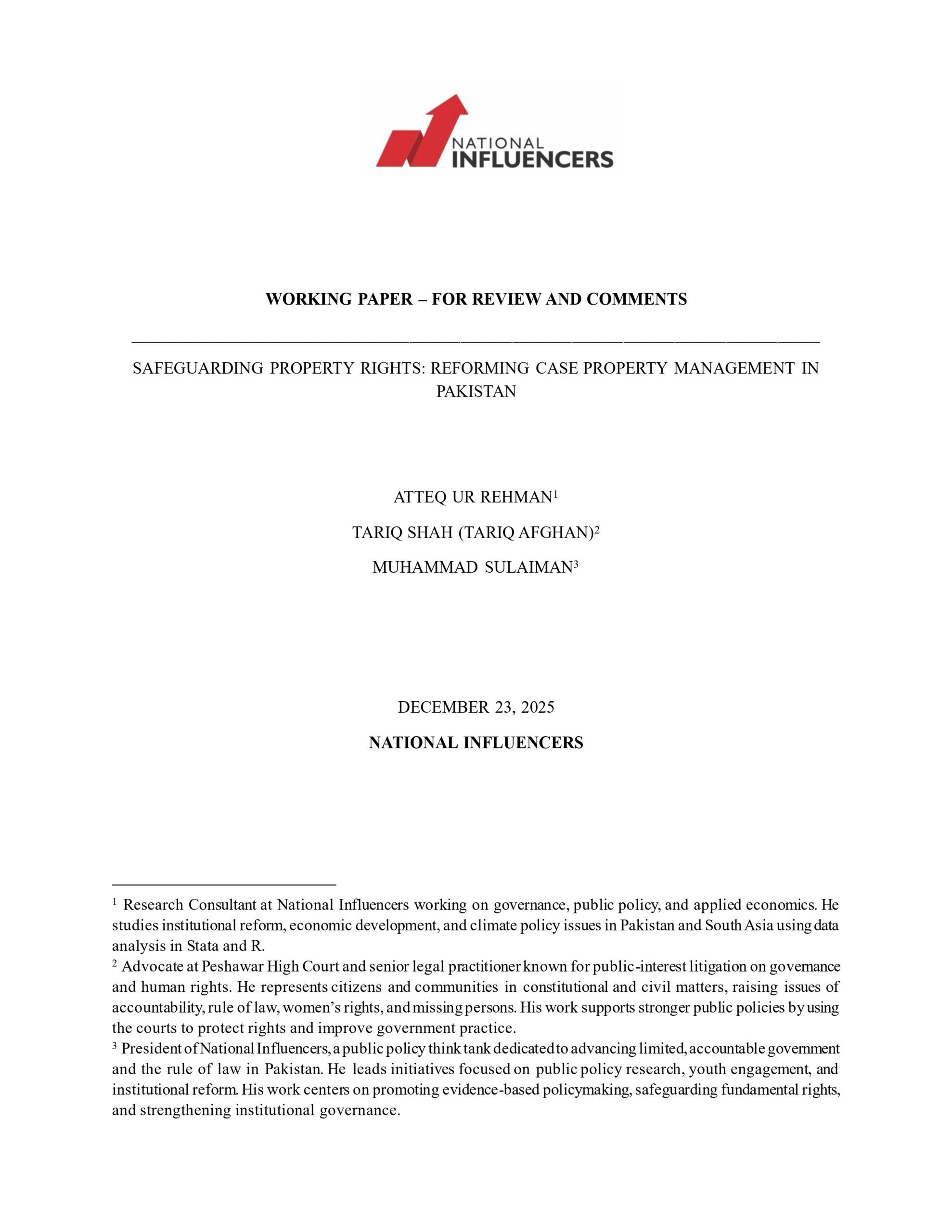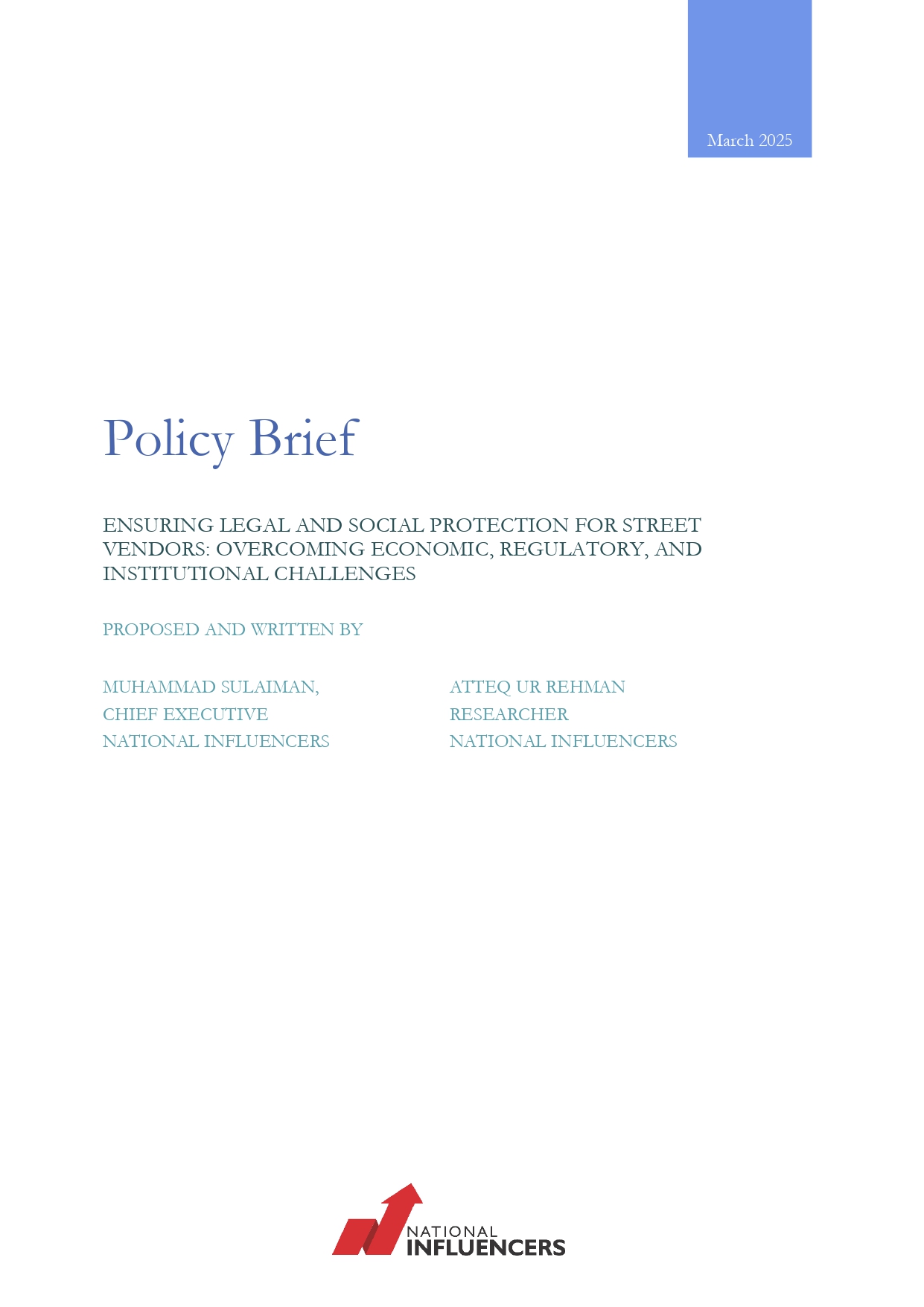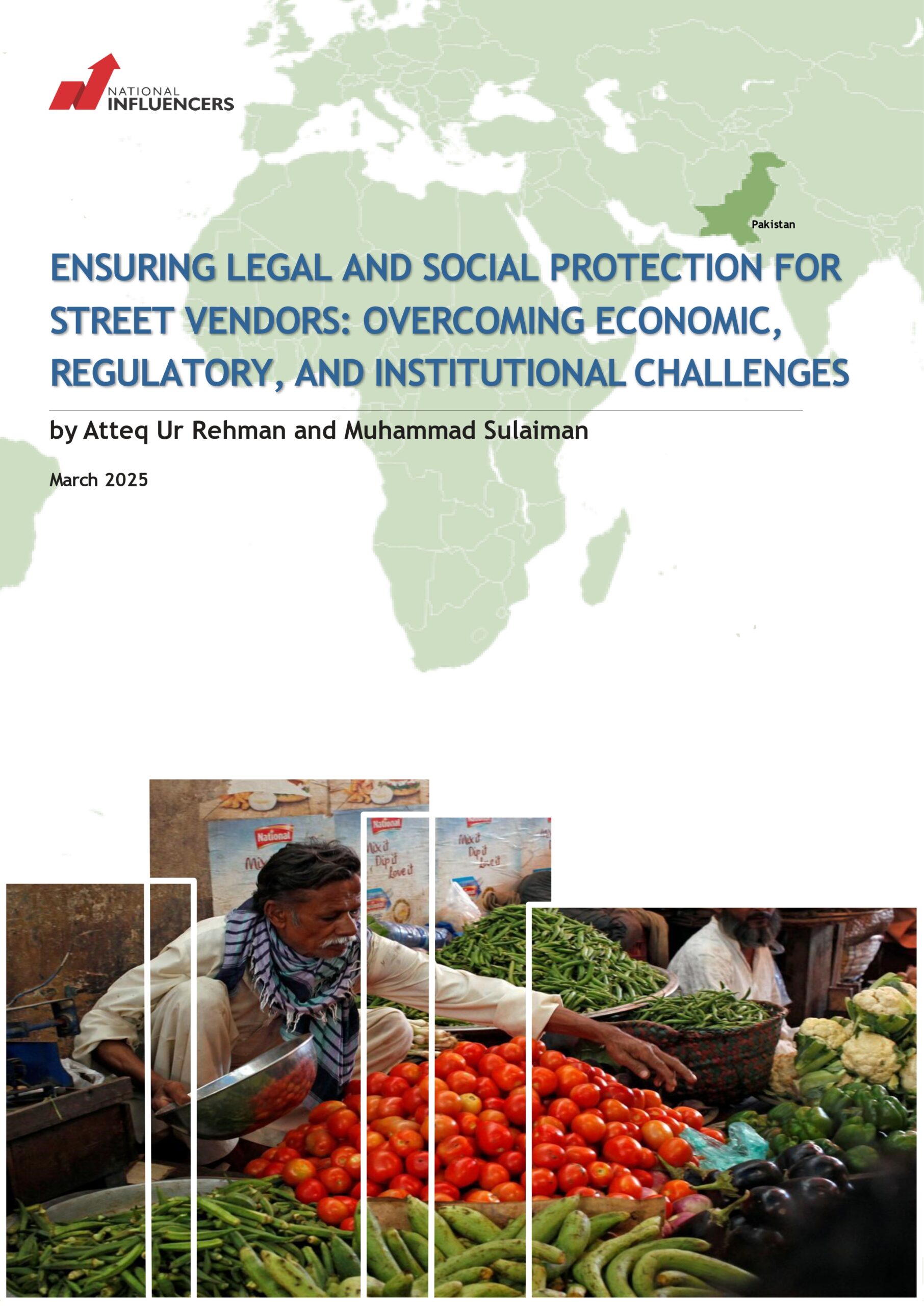Pursuing sound policies for today and tomorrow

Safeguarding Property Rights: Reforming Case Property Management in Pakistan
This document is a working draft of the research paper “Safeguarding Property Rights: Reforming Case Property Management in Pakistan.” It is made publicly available to invite comments, critiques, and suggestions. The paper will be updated before final publication.

Institutional Transplantation and Reconfiguration of Incentive-Structures
This study is an attempt to analyze the process of the state-sponsored institutional transition in the newly-merged districts of Khyber Pakhtunkhwa – from a traditional, tribal order to a rational, relatively liberal state-order. Relying on historical institutionalist framework, we address the following questions: Does institutional transplantation as a strategy to trigger an intended social change works invariably? And, how do the newly-established institutions in the tribal Pakhtun belt of Pakistan interact with the extant traditional institutions and customary practices of the local population? To answer these questions, we employ qualitative methods of data collection and analysis. Our major sources of evidence include focused group discussions, elite interviews, and personal observations. In the light of the data we collected from the field, we conclude: 1) that the newly instituted (relatively liberal) order – or at least some elements therein – is in conflict with an “ideal Pakhtun” tribal character of the newly-merged districts; and, 2) that majority of the indigenous population are disillusioned with the newly-instituted state-order: they question both the will and capacity of the state to actuate socioeconomic and political transformation of the tribal Pakhtun belt of Pakistan. In the light of our research findings, we propose that, besides forcefully asserting its sovereign rights to govern the newly-merged districts, the state needs to introduce several policy reforms in order to encourage democratic accountability, formalization and digitization of market, and strong civil society and professional organizations. We emphasize that these (and similar) policy measures will prove instrumental in (re)building (and maintaining) trust between the state and society; in transforming the structures of incentives in favor of the newly-instituted state-order; and, in inspiring the indigenous society and market get integrated with the rest of the country and beyond.

Micro, Small and Medium Enterprises in Newly Merged Districts: Stone Crushing Industry Between Hope & Dispair A qualitative study of Mines and Mineral Sector in District Khyber of Newly Merged Districts, Khyber Pakhtunkhwa
Pakistan has been the target of various intensities of war and terrorism since the events of 9/11. Khyber Pakhtunkhwa and its Newly Merged Districts (NMDs) have been most adversely affected where the economic system and social fabric is irreversibly damaged. In 2018, the NMDs were merged with Khyber Pakhtunkhwa in an attempt to address this damage and bring the area at par with the rest of country. However, it has resulted in a variety of unforeseen consequences. This study was envisioned and undertaken after observing the refusal of local business community to accept the regulatory mechanism stipulated by the constitution of Pakistan. An extensive fieldwork with crush plant owner and staff and mine owners was undertaken to provide insights and suggestions for improving the situation. The results of the study are based on limited data collected from one important sector and are in no away a single or decisive view of the happening in NMDs. Yet, they provide a scientific understanding of the fragment of reality and give voice to the individuals who have been exposed to highly adverse conditions for decades. It is hoped that this study will initiate a series of efforts to understand, document and deliberate upon the regulations governing business environment in NMDs. It is hoped that the government along with policy makers, bureaucracy as well as international donor and human rights institutions will encourage scientifically valid and knowledge-based intervention in the region for its improvement.

SAFEGUARDING PROPERTY RIGHTS: REFORMING CASE PROPERTY MANAGEMENT IN PAKISTANGLIZATION
Pakistan’s vehicle Supardari mechanism—designed to protect property rights under constitutional guarantees—is weakened by slow procedures, outdated legal frameworks, and inconsistent enforcement.
Although the Code of Criminal Procedure (CrPC) provides mechanisms for the interim release of seized
vehicles, the system suffers from delays, vague procedures, and weak coordination among the police, excise, and the judiciary. As a result, seized vehicles remain in custody far longer than necessary, often without proper documentation, maintenance, or transparency, leading to vehicle deterioration and serious financial losses for owners. Findings from lawyers, police, excise officials, judges, community members, and affected citizens reveal a
consistent pattern: legal awareness among practitioners is high, but public knowledge is extremely low. Standard operating procedures exist across departments, yet weak compliance, partial record-keeping, and
the absence of a unified digital system allow misuse to persist. Many respondents reported that officials frequently or occasionally used seized vehicles for personal purposes, creating mistrust and widening the gap between law and practice.
The economic consequences are severe. Most affected individuals rely on their vehicles for income, particularly taxi, transport, and delivery workers. Long custody periods deprive them of earnings, force
borrowing or asset sales, and worsen household hardship. Community perceptions further highlight dissatisfaction, fear of misuse, and low confidence in the fairness of Supardari procedures. Overall, the evidence points to a system where rules exist but implementation is fragmented, uneven, and economically regressive.
To address these gaps, the brief proposes a set of practical, high-impact reforms. These include establishing a unified national law for seized vehicles, creating centralized and secure depots, launching a digital chain of-custody registry, introducing one-window facilitation for citizens, and enforcing strict and time-bound judicial orders. Additional reforms—such as mandatory audits, penalties for misuse, state-funded custody costs, and fast-track processes for income-generating vehicles—are essential to restore trust, protect livelihoods, and strengthen constitutional property rights in Pakistan. Therefore, these measures can shift Supardari from a discretionary, opaque system to a transparent, standardized, and rights-based framework
that protects citizens while supporting efficient law enforcement.

POLICY BRIEF: ENSURING LEGAL AND SOCIAL PROTECTION FOR STREET VENDORS: OVERCOMING ECONOMIC, REGULATORY, AND INSTITUTIONAL CHALLENGES
Street vendors are a key component of the informal economy, providing essential products while generating jobs in low-income regions. The study’s goal is to examine the challenges that street vendors face while also highlight the wide range of services they offer to the community. The research also tries to analyze the issues that street vendors create to government authorities and the general public. The survey covers 174 respondents from different sectors. The study focuses on Board bazar market, Qissa-Khwani bazar, Bacha-Khan Chowk, and Sadar bazaar. The primary data were collected through a questionnaire from street vendors in different markets across Peshawar. The study show that 90% street venders lived in rented house. During vending these street venders face several challenges like harassment, bribe or pressure from different government authorities. The main reason for this unfair treatment is encroachment, illegal tax and resistant with authorities. Similarly, street vender also creates many problems for general public and government authorities. The common issue such as congestion and interruptions in public places, crowding, traffic congestion, and waste management issues that are face by authorities & general public. However, the study highlights that there is no clear rules or regulation or even vender Act for the rights of street vender. Based on survey from different official authorities it confirmed that there is no law for street vender but they follow the direction from high authorities to deal it them.
